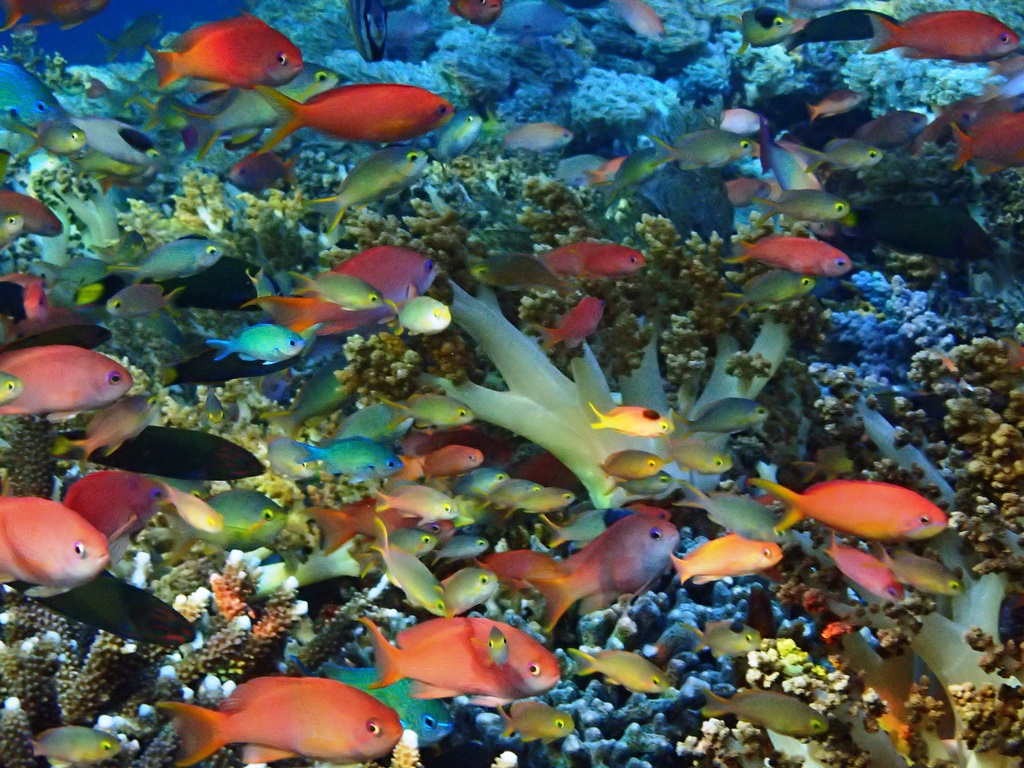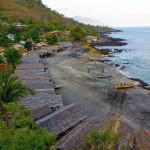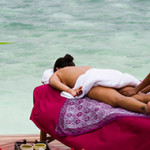I’m enamored with Indonesia. The country lies in the heart of the Coral Triangle and offers the world’s highest bio-diversity. The archipelago is made up of 17,000 islands and offers a stunning range of snorkel sites from sandy shallows to dramatic walls. This region features over 500 species of corals and 2000 species of fish.
It’s worth several trips to experience some of the different marine environments. Raja Ampat, Komodo, Alor and Wakatobi are four of the top destinations for divers and snorkelers.
Each area is spectacular and unique. The astonishing variety of marine life is staggering. The diversity of marine habitats translates to wildly different snorkeling experiences.
- super fishy!
Throughout Indonesia you may find schools of fusiliers, surgeons, bannerfish, triggerfish and squadrons of jacks and barracuda. Other highlights include pygmy seahorses, mandarin fish, wobbegongs, turtles, majestic mantas and even dolphins! Gorgeous seafans, dance in the current. Coral gardens stretch in what seems like acres, allowing us to explore the beauty of the reefs for hours.
- Nudibranch
Please refer to my current trip offerings to see my next snorkel adventures offered to this fascinating region.
The best time of year to travel and the water temps vary
from region to region in Indonesia. Indonesia covers over 740,000 square miles so there are many different climate zones. I organize my trips to take advantage of the most
ideal conditions in the area we are traveling.
Besides offering some the best snorkeling on the planet, Indonesia is well worth extended time to sightsee and explore the culture on different islands.
Bali. There is no other place like Bali. Great beaches, volcanic mountains, terraced rice fields, elaborate temples to visit and explore, and many gifted artists are some of the highlights. What makes Bali so unique is the people and religion. The Balinese are lovely and welcoming. The Hindu religion permeates day to day life, and festivals and ceremonies reflect this. Spectacular offerings that soar towards the sky are seen balanced on women’s heads on the way to a temple. By all means while you are in Bali ask the locals about any ceremonies taking place during your stay, visitors are warmly invited. Bali is well worth several weeks to explore.
Sulawesi The island of Sulawesi offers many diverse experiences. In the north there is a unique area called Tana Toraja land. The Toraja ethnic group have animistic beliefs and unusual death and burial ritual. Loved ones are buried in cliff-side caves. Life size wood effigies of the dead grace the cave entrance.
Toraja funeral rites are important social events, usually attended by hundreds of people and lasting for several days.
Northern Sulawesi has many wonderful snorkel/dive resorts and also an opportunity to see Crested Macaque’s and the diminutive Tarsier in the nearby National Park.
In Southeast Sulawesi Wakatobi Resort offers world-class snorkeling/dive on their house reef.
http://www.wakatobi.com/home.php
- Palm Bungalow
- Dining by the sea
This unique luxury eco- resort is well worth a stay to indulge in great snorkeling, food and relaxing massages.
I offer a yearly group snorkel trip to Wakatobi but I can also arrange a private trip for you anytime you want to go!
Indonesia Travel Requirements and General Information
- Passport and Visa Information: Beginning June 12, 2015, U.S. and Canadian citizens can enter Indonesia visa- free as long as your travel is for tourism purposes and your stay will be for less than 30 days. Your passport will still be stamped but no fee will be collected.
Currently, this visa-free facility is only available for international visitors who arrive by air through one of the following five airports: Bali (Denpasar Ngurah Rai), Jakarta (Soekarno Hatta), Surabaya (Juanda) Medan (Kualanamu) or Batam (Hang Nadim), and four international sea-ports.
Note: the final decision on whether a traveler qualifies for a visa exemption or must enter using visa on arrival rests with the immigration official at the port of entry and is not guaranteed for all travelers.
Your passport MUST have 6 months validity remaining from the time of your departure from Indonesia. You will not be permitted entry into Indonesia if you have less than 6 months remaining on your passport. Your passport must have 2 blank pages not including the endorsement pages. - International Flight tickets issued after February 2015 no longer incur an international departure tax. If your flight ticket was issued prior to February 2015, expect to pay an Indonesian International Departure tax of Rp 200,000 (about USD 17) upon departure. Please ensure that you have enough Indonesian currency available to pay this fee on the day of departure from Indonesia.
- Currency: Important only bring clean crisp bills in good conditions that are issued from 2006 onward. Torn and marked older bills will not be able to be exchanged.
- Health: When travelling in the tropics, it is wise to be up to date with Typhoid, Tetanus/Diphtheria, Hepatitis and a current Polio protection. As parts of Indonesia are in a malaria zone please check with your physician or medical center on the type of prophylactic you should use and ask:
What are the known side effects?
Make sure you take the appropriate medications in time before you start the trip.
Drink bottled water and stay hydrated. - Cultural Sensitivity: Indonesia is a large country with different religions and culture depending on the island. While most of Indonesia is Islamic, Bali is Hindu. Since this is where most people frequent I will address etiquette in Bali.
- Dress and act modestly. Balinese locals are far more conservative than most Westerners. Dress modestly, especially when visiting temples. When paying a visit to a Balinese temple, both men and women are expected to wear shirts that cover shoulders and part of the upper arms.
- The following leg coverings are mandatory for both men and women preparing to enter a Balinese temple: Sarong around your legs Temple scarf around your waist. These items are usually rented out at most temple entrances, but you’re absolutely free to bring your own.
- Don’t use your left hand to touch or give: The left hand is considered “polluted”, and should not be used to touch other people or to hand something over. The exception is when you use both hands to hand something over to someone; this is considered a high compliment.
- Don’t use your index finger to point or to beckon. If you need to call attention to someone, beckon him/her to come by extending your hand and, with palm facing down, making a downward wave.
- Don’t touch people’s heads. The soul is supposed to reside in one’s head, making it off limits for people to touch. Not even children (Balinese children, that is) should be touched on their heads.
More information about changing money:
US dollars are accepted by most merchants in Bali. However, while in Indonesia, it is always cheaper to use Rupiah rather than US Dollars. This is because the merchant will apply an exchange rate to convert your US Dollar to rupiah. Generally you will get a better exchange rate from an ATM or authorized money changer.
In Indonesia, recent issue higher denomination US Dollar bank notes will receive a better exchange rate when compared to smaller denomination dollar bills. If you are carrying US Dollar cash, it is best to ensure recent issue unmarked, unfolded 50s and 100s.
It is sometimes tough to find banks or money changers willing to accept hundred dollar bills that are over five years old. If you think you might be doing some serious shopping while in Bali, make sure you bring with you crisp, clean, newer notes–it actually does make a difference!
ATM machines are a good way to exchange money. There are ATM machines throughout the airport, as well as a number of money changers.
Authorized Money Changers (displaying signs) in specialist money changing shops and kiosks are the best way to change cash to save time and get a good rate.
Note: Some money changers are a little less than scrupulous. You should always count your money before leaving and not just rely on watching them count it.

















